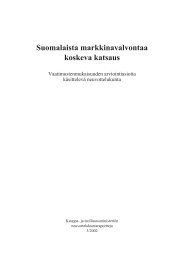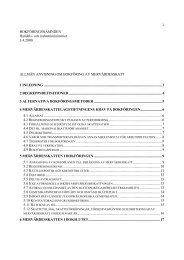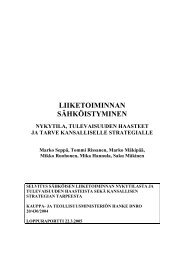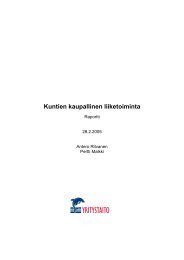Knowledge Intensive Services' Suppliers and Clients
Knowledge Intensive Services' Suppliers and Clients
Knowledge Intensive Services' Suppliers and Clients
Create successful ePaper yourself
Turn your PDF publications into a flip-book with our unique Google optimized e-Paper software.
17<br />
business service, accordingly receive very little attention in what follows, <strong>and</strong> often<br />
such attention as they are given is merely a consequence of their being collapsed<br />
together with KIBS in data or analyses we are reviewing. <strong>Knowledge</strong>-intensive<br />
service activities within firms, however, receive a little more attention. They are not<br />
the focus of the study, but are important to the analysis of KIBS in two ways. First,<br />
they reflect the make-or-buy, market-or-hierarchy, internalisation-versusexternalisation,<br />
in-house-versus-outsourcing (etc.) dynamics that play a role in<br />
KIBS development. Second, they are important in that the utilisation of KIBS<br />
inputs into firms, <strong>and</strong> indeed the definition of what these inputs should be, will<br />
often relate to the “absorption capacity” of the clients, which is in part a matter of<br />
their internal knowledge-intensive service activities.<br />
1.2.2 A note on other knowledge intensive activities<br />
This essay is mainly focused on the literature about KIBS. However, it should be<br />
remembered that not all <strong>Knowledge</strong> <strong>Intensive</strong> Service Activities (KISA) are<br />
supplied by KIBS. Some are supplied by public sector organisations, such as public<br />
laboratories, Universities, government agencies. Some are supplied by firms that<br />
are in the main not service firms. Many services are supplied on an in-house base to<br />
“clients” within the company. Furthermore, manufacturing firms often supply<br />
services (mainly, but not always complementary to their material products) to their<br />
clients, <strong>and</strong> non-knowledge-intensive services may supply KIBS-type outputs to<br />
their clients (usually services complementary to their main service products).<br />
Some <strong>Knowledge</strong>-<strong>Intensive</strong> Service activities are carried out on an in-house basis<br />
for their parent organisations, <strong>and</strong> do not supply any KIBS for third parties. And<br />
some <strong>Knowledge</strong>-<strong>Intensive</strong> Services are supplied mainly to final consumers, as<br />
public services (e.g. health) or private professional ones (consumer financial advice<br />
or computer repair). KIBS mainly service private businesses, or supply similar<br />
types of service to public organisations (this forms a very important source of<br />
business for them in some countries).<br />
Services are increasingly evident elements of many productive activities. In part<br />
this represents a division of labour within organisations similar to that occurring<br />
across organisations when KIBS emerge as specialised firms. KISA which were<br />
earlier “invisible” parts of the bundle of activities comprising another job have been<br />
differentiated into specialised occupational roles <strong>and</strong> even parts of the organisation.<br />
But also, new KISA emerge to meet requirements associated with technological<br />
<strong>and</strong> organisational change <strong>and</strong> the challenges of changing business environments.<br />
The value-chain of economic activities that are embodied in final <strong>and</strong> intermediate
















